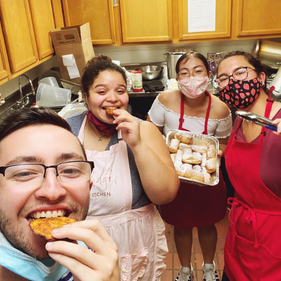Hillels Around the Country Adapt to Cooking and Baking in New Environments

From challah to babka, to cookies and beyond, cooking and baking have always been integral parts of the Hillel experience nationwide. Yet, when the pandemic first hit, Hillel professionals faced the challenge of maintaining these culinary traditions while keep students and themselves safe . Away from the comfort of Hillel kitchens and resources, Hillel staff have now found innovative ways to continue cooking and baking alongside their students.
“How am I meeting these students when everything is shut down?,” asked Whitney Fisch, Executive Director at Hillel at Miami University. “The first thing I did to introduce myself to the community was have a virtual cooking event.”
In addition to her job at Hillel, Fisch also runs a food blog called JewHungry, where she shares kosher recipes and stories from her kitchen. “[The blog] has meant the creation of community connection, which means everything,” she said.
As an educator, Fisch enjoys connecting with her students and seeing them take on new endeavors with cooking and baking. Regarding her online cooking event, Fisch said, “It was the start of our students building connections with other students who loved food.”
At Johns Hopkins Hillel, Executive Director Noam Bentov also feels proud seeing students coming together to cook virtually. Last summer, he and his wife hosted a virtual cookie baking event for students at home.
“I had to factor in all the challenges of being socially isolated, having my kids at home, and doing something meaningful for our students,” Bentov said. “We made these cookies [on Zoom] with Reese’s pieces, chocolate chips, and pretzels, and it all came together and we loved it.”
While some Hillel campus leaders turned to Zoom to garner a sense of community, others found ways to engage with students in small group settings.
At the University of Vermont Hillel, the Hillel Fresh program supplies students with a box of ingredients each week so that they can prepare Shabbat dinners with step-by-step instructions. Inspired by the popular meal-kit plan Hello Fresh, Hillel Fresh gives students the opportunity to support their local community by utilizing produce from nearby farms.
“The program, especially in the pandemic, has grown so much,” said Lindsey Sigal, the Hillel Engagement Director at UVM. “Hillel Fresh was an opportunity where [roommates] could reflect, debrief, and rest from the long week, especially now with pandemic life being harder than whatever normal was before.”
As many campuses begin to incorporate more in-person components into their programming, both Hillel staff and students are excited to see what lies ahead for their communities.
A few weeks ago, Alanna Horowitz, Hillel Student Board Member and senior at Johns Hopkins, hosted her campus’s first in-person baking event in almost two years. She led a pink and teal challah bake in honor of Sharsheret, a Jewish organization dedicated to raising awareness for breast cancer and ovarian cancer.
“Being able to bring food back into our Hillel building was incredibly rewarding,” Horowitz said “We got one of the biggest turnouts for an event since the pandemic, which speaks to the desire for community.”
Ilana Hamer, President of Challah for Hunger at Columbia University, echoes this desire for community and reflects on how the pandemic has affected the club’s mission of fundraising and spreading awareness about hunger through challah baking at Hillel.
“As a food club, we weren’t functioning in the pandemic and most people weren’t on campus,” Hamer said.
Nevertheless, Hamer points out how the pandemic has allowed the club to reflect and further expand its goals.
“Now that we’re back on campus, we’re really focused on bringing advocacy into the heart of our work,” she said. “ This is what’s bringing us together as an organization; we’re no longer just making and selling wonderful challahs.”
Reflecting on these community goals has been a key element of many Hillels throughout the pandemic.
At Miami University Hillel, Whitney Fisch emphasizes the importance of intersectionality and bringing different student groups together.
“We’re trying to create collaboration through food: bringing other students to our kitchen, cooking together, and hosting them for Shabbat,” she said. “Last week, we had UNIDOS Shabbat, the Hispanic student organization on campus, and their president came and taught us how to cook traditional, and kosher, pastillos and tostones.”
At Johns Hopkins Hillel, Noam Bentov emphasized his excitement as Hopkins Hillel planned for its first in-person Shabbat dinner since the start of the pandemic.
“I’m so excited because it’s been two years since we’ve seen a normal Shabbat. We bring people together to create joy, and that’s part of our mission here.”